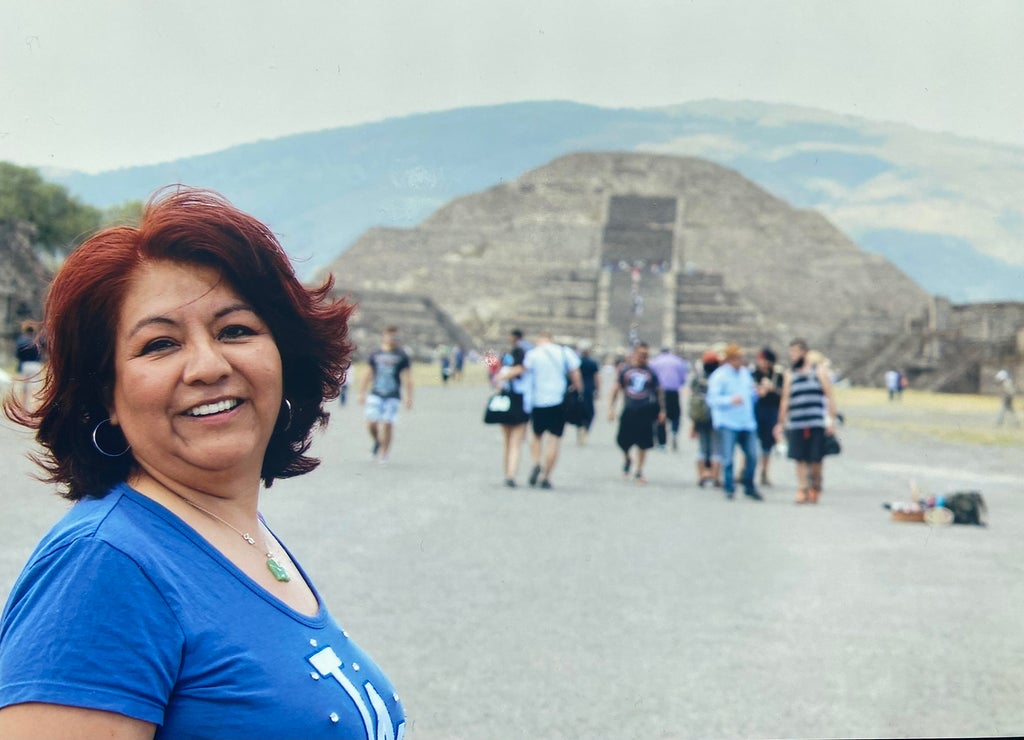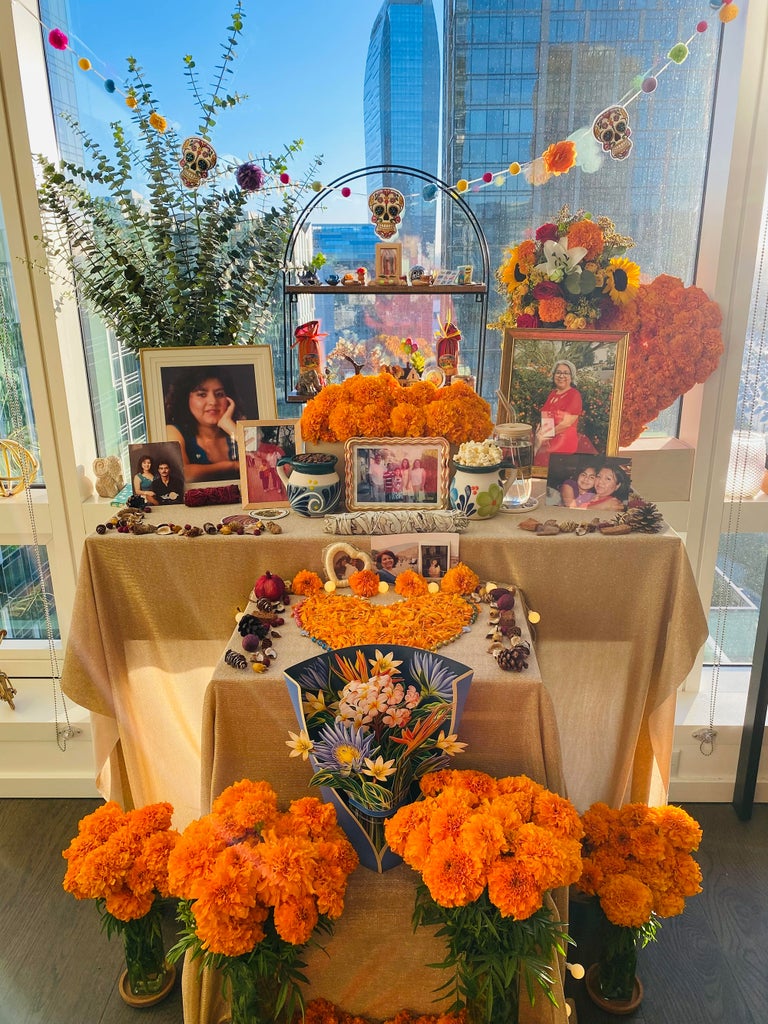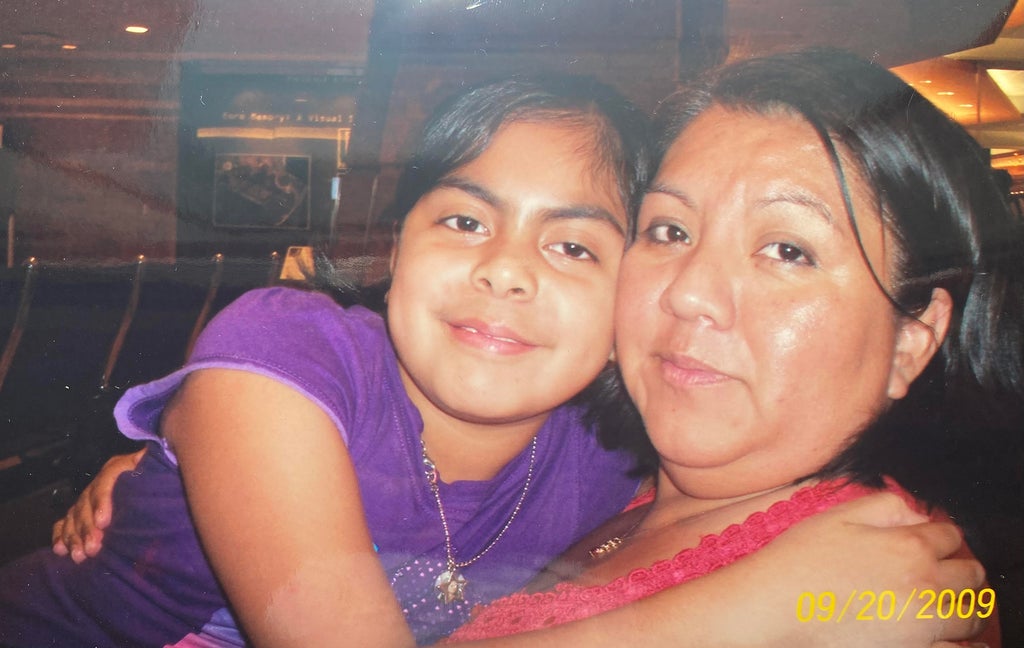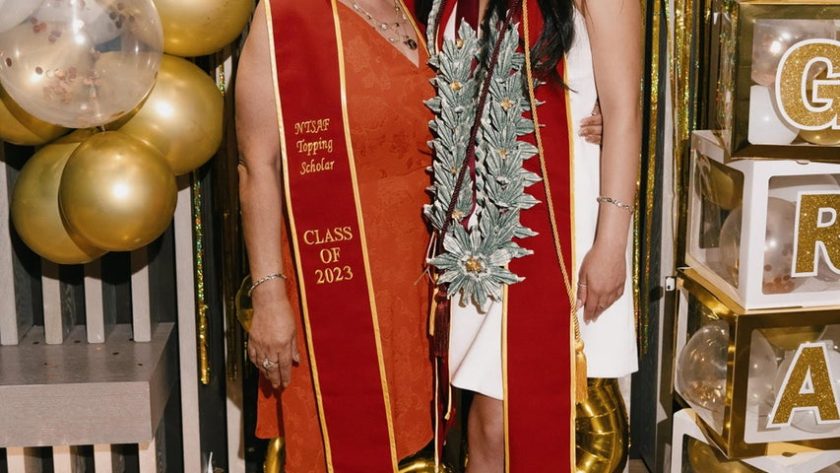I never celebrated Día de Muertos before. The Mexican holiday, which remembers and honors loved ones who have passed away, was never formally observed in my Mexican-Guatemalan home. With its colorful ofrendas and calavera face-painting, it seems like the kind of holiday my craftsy, Mexico-born mom would have embraced. Two months since she died, I’m observing Día de Muertos for the first time, and I’m learning how this ancestral practice centered on connecting with the dead could actually help me live a full, purposeful life for my mother.
At 23 years old, losing my mom at the young age of 54 has been one of the most significant, detrimental, and deeply heart-wrenching events to happen to me. I didn’t expect my mom’s death to occur so early on in her life, and I couldn’t ever fathom the depths of devastation I’m experiencing now, such annihilating feelings of loss, heartbreak, and vengefulness toward the world for something I cannot change. While I grapple with all these feelings, I’m also considering how I could best embody my mom’s spirit and embrace the life she lived.
“My mom’s struggles informed her guidance, wisdom, and love. Her fight was always rooted in love, love for me, for her family, for her community, and for herself.”
Irene Franco Rubio
As a child of immigrants, I was raised by a mother who was a luchadora, a fighter. She fought because she had to and because of her love for us. From her birth in Mexico City, immigrating to East Los Angeles, and raising me and my siblings in Phoenix, Arizona, my mom’s life was shaped by government-sanctioned discrimination and violence. My mom’s struggles informed her guidance, wisdom, and love. Her fight was always rooted in love, love for me, for her family, for her community, and for herself.

Like her, love will continue to be at the center of my own struggles. As a young person, witnessing my mom’s premature death, and recognizing how her passing could have been prevented if it were not for a discriminate healthcare industry, environmental injustice, and capitalism’s demands to work yourself sick, has emboldened me in my activism.
When ideologies of capitalism, racism, colonialism, xenophobia, and patriarchy (among others) are blended together and poured upon the lives of communities of color, we suffer the political — and physical — consequences. By recognizing the institutions perpetuating systemic harm, it becomes abundantly clear to me that my mom’s death, like that of many, was by design. For me, it is not enough to accept that her death “just happened” or to simply “move on.” Instead, her passing has greatly contributed to an already existing fire within me that pushes me toward a relentless pursuit of justice, for her and for us all. Fighting against the systems, institutions, structures, and ideologies that harm our people is one way I choose to celebrate her life.
“Her passing has greatly contributed to an already existing fire within me that pushes me toward a relentless pursuit of justice, for her and for us all.”
IRENE FRANCO RUBIO
Día de Muertos, a time when communities impacted by death come together, is also helping me redefine what honoring and celebrating my mom could look like. My mom was an artist, a Pinterest DIY señora. Arts and crafts brought her so much joy, and each project she worked on displayed her artful talents. For me, there’s no one more deserving of the flamboyant and vibrant decor of Día de Muertos than my Mexican mother, so I made my very first ofrenda this year for her.

Growing up, my Guatemalan dad always had an altar for his lost loved ones that held a lit candle, cup of water, and a framed Virgencita looking down upon us — but we didn’t engage in any festive celebrations. This year is different. I set out to Los Angeles’ prominent Flower District to gather all the essentials and began to build my first altar. On it, there are a dozen sets of bright orange cempasúchil traditional flowers, a sheet of shiny gold tela for the mantel, pinecones, and photos of her in gold-plated frames strategically placed throughout. I also added some Guatemalan coffee beans and freshly popped popcorn into two Jarritos ceramics and poured some iced water into a glass cup with her favorite glass straw.

After weeks of debilitating yet hidden grief, putting this altar together helped me experience joy again. While working on the ofrenda, I felt my mom’s presence. Now, seeing it reminds me that she remains with me in spirit, and it helps me to remember her laughter, her smile, and her joy. My mom taught me what it means to live a life of delight, care, and fun, and I want to embody her values forever.
“Honoring my mom means living a life of radical love, for myself, for my community, and for the departed.”
IRENE FRANCO RUBIO
I’m learning to honor my mom throughout my daily life by remaining fiercely guided by a higher purpose, actively striving toward the goals we always talked about, and remaining true to who I am by never forgetting where I come from, as she often reminded me. Now, as I’m working toward a Ph.D. in ethnic studies, there is no doubt that my mom’s life and death are intractably linked to a greater purpose to serve historically oppressed populations.

In order to fully honor and celebrate my mom, and all of our loved ones who have transcended from the physical realm, I find it important to address all the feelings of sadness, anger, heartbreak, frustrations, and vengefulness that comes with grief — and use these emotions as fuel for good. I’m centering all the love I carry for my mom to advocate for what’s right in a world of so many wrongs. Honoring my mom inspires me to live my life as fully and intentionally as possible, as she would have wanted for me. Honoring my mom means living a life of radical love, for myself, for my community, and for the departed.
Like what you see? How about some more R29 goodness, right here?



